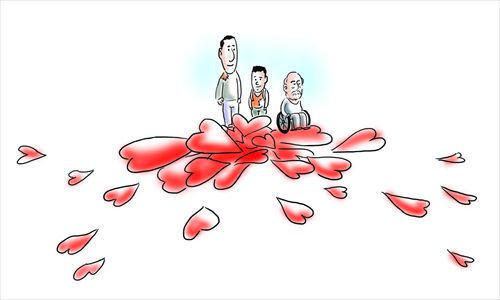What keeps Chinese from generosity?

Illustration: Liu Rui/GT
Chinese don't give. That's the sad conclusion of a recent study by a British foundation on global charity that ranked China second from last in the world in terms of money and time donated. That doesn't mean that there aren't millions of generous Chinese - but collectively, the figures are depressingly low.
Part of this is historical damage. There hasn't been a lot of space for idealism in China in the last few decades, and those who put themselves first seemed to thrive. When times are tight and everybody is looking to get ahead, it's hard to ask people to share. Yet countries in much worse condition than even China in the 1980s are more generous givers. And today, when China aspires to be a "moderately prosperous society," a growing and massive urban middle class should be finding more ways to give.
Charity thrives when people can work together. Individual donations, even when a flood of them pours in after a disaster such as the Sichuan earthquake, can't equal the same commitment as weekly or monthly volunteering. But that needs structures to volunteer with, whether they're religious, sub-cultural, or local. Official organizations in China are often badly compromised, as the ease with which the Guo Meimei scandal around the Red Cross spread.
Religious bodies are the biggest component of charitable giving worldwide. But Christian and Islamic congregations often have a difficult time operating in China, especially if they move outside of the sphere of belief and into social areas that the local government considers its territory. Buddhist charity is the biggest and operates the most easily, but is also sadly corrupt; monastic scandals erupt on a regular basis, and followers are more likely to give to individual gurus than to organized groups that could use the money more efficiently.
Another noticeable absence is the deficit of volunteering in China. This may reflect the urban problems that younger Chinese face, where their time and energy is eaten up by long commutes and over-demanding bosses who barely recognize the idea of private time. But it may also reflect that older people, who make up the majority of the volunteer sector in other countries, tend to direct that energy into caring for grandchildren or policing the neighborhood.
Indeed the biggest problem Chinese charity faces may be the dominance of the family. With parents under social and cultural pressure to spend every penny on their offspring, and adult children under the same pressure to save every penny for their own future children and the care of their retired parents, there's little to spare for anyone outside the family. For the childless, the orphaned, the abused or the outcast, that doesn't leave much hope.
What can be done about this? Volunteer groups need to be encouraged. There's already plenty of publicity for them on state television channels, but they also need to be given the legal and political space to operate without regular intrusion or the threat of being closed down by some suspicious or over-zealous official.
A wider range of models for charity should be embraced. The regular efforts to revitalize the spirit of sacrifice often refer to heroic figures of the 1950s and 1960s that mean very little to young Chinese today.
Social media allows more space for such figures to emerge naturally from the grassroots, rather than being over-promoted or the subject of cringe-worthy "most beautiful young charitable spirit" ceremonies. The more possible models there are, from millionaires who give up their fortune to care for dogs to young people who go to teach in the countryside in poor conditions, the greater the reach of charity can be.
And China can embrace a more generous model of the family, one that looks to Confucian ideas without being dependent on biological relation. In the past, it was common for families, especially childless ones, to adopt promising children from their local area and treat them as their own, or for the rich to take on the responsibility of supporting elderly people without anybody else to care for them. But today a narrow idea of family responsibility dominates, one that calls back to patriarchal traditions separate from, and older than, Confucianism.
If we encouraged people to think of the idea of filial piety as reflecting the necessity to care for all older people, not just their own parents, there would be more room for care. Socialist tradition, and Chinese rebel ideas of the past, has always preached that "all men are brothers." We don't have to get rid of the family to make China a more generous place, but instead make the idea of the family bigger.
The author is a Global Times editor. jamespalmer@globaltimes.com.cn Follow us on Twitter @GTopinion